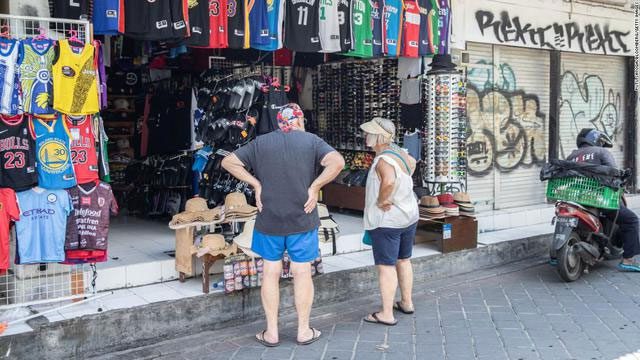It is currently winter in Australia, and for the first time in three years of travel restrictions due to the pandemic, thousands of residents are flying to Bali, Indonesia, to enjoy a vacation and soak up the sun.
However, Australian officials are increasingly concerned about the items that travelers are bringing back home and are considering advising tourists to leave their flip-flops behind in Bali.
Foot-and-mouth disease (FMD) is rapidly spreading among livestock in Indonesia, and on July 5, it was confirmed that FMD is circulating among cattle in Bali—a popular tourist destination with numerous direct flights to seven cities in Australia.
Mark Schipp, Australia’s Chief Veterinary Officer, stated, “The impact of FMD would be very serious if it reaches Australia.”
This disease is harmless to humans but causes painful blisters and lesions in the mouths and feet of cloven-hoofed animals such as cattle, sheep, pigs, goats, and camels, making them unable to eat and, in some cases, can lead to severe lameness and death.
This disease is considered the greatest biosecurity threat to Australia’s livestock, and an outbreak could result in the mass culling of infected animals and the closure of the country’s valuable beef export markets for many years to come.
Fiona Simson, President of the National Farmers’ Federation, remarked, “The impacts on farmers if FMD enters are truly catastrophic. But it doesn’t just affect farmers. About $80 billion of Australia’s GDP would be wiped out, and this would be an economic disaster for everyone.”
Australia has begun to enhance biosecurity measures at airports, inspecting luggage for meat and cheese products, and warning travelers that dirt on their shoes and sandals could inadvertently trigger the first outbreak of FMD in Australia in 150 years.
However, the issue is that the footwear commonly worn in Bali does not align with standard biosecurity measures in Australia.

Bali is a favorite destination for Australian travelers. (Photo: CNN).
Mr. Schipp stated, “Many people returning from Bali do not wear shoes. They wear flip-flops, and you really can’t ensure that disinfectants don’t stick to the skin of the user.”
He mentioned that officials are considering requiring tourists to abandon their flip-flops.
Mr. Schipp advised, “If you’re wearing flip-flops in Bali, then leave them behind in Bali.” Although this footwear advice has not yet been formalized into regulations, it is under consideration, he added.
Indonesia’s Foot-and-Mouth Disease Outbreak
This disease is spreading rapidly in Indonesia, where the first cases were detected in April. In May, Indonesian authorities warned Australia, along with New Zealand, Central and North America, and Western Europe, to exercise caution, even though the disease had not yet appeared in those regions.
Indonesian Agriculture Minister Syahrul Yasin Limpo stated that the country has attempted to implement a vaccination program, but by June 27, only 58,275 out of approximately 17 million livestock had been vaccinated.
Mr. Schipp indicated that the slow rollout of vaccinations highlights logistical challenges in a country spread across thousands of islands.
The timing of the outbreak is also disastrous in Indonesia, occurring just weeks before the Idul Adha sacrifice festival. During the three days from July 10, animals are often sold in large numbers for slaughter. After families pray and have meals together, they sacrifice livestock and distribute the meat to the poor.
Mike Tildesley, an infectious disease modeling expert at the University of Warwick, told CNN that slaughtering does not significantly increase the risk of infection; rather, the issue is “moving them in large numbers to festival sites.”
“We have seen this in Turkey—where the annual Kurban festival also involves the slaughter of a significant number of livestock. The large movement of livestock across the country often leads to an increase in FMD cases,” Mr. Tildesley shared with CNN in an email.
He added, “Transmission can also occur through contact with their meat, especially in the first few hours after slaughter. And that’s why handling meat from infected livestock must be done very carefully.”
According to Indonesia’s Ministry of Agriculture, as of July 7, the FMD outbreak had spread to over 330,000 animals across 21 provinces. Thousands of vaccine doses from France have been sent to Indonesia, and over 350,000 animals have been vaccinated.
For Australia, vaccinating animals is only an option once the FMD virus has entered, as vaccination would affect the country’s trade.
Mr. Schipp stated, “If we vaccinate beforehand, we would lose our status as an FMD-free country and lose access to our markets and trade.”
Ross Ainsworth, a veterinarian with 40 years of experience living in Bali, noted that tourists on the island can easily come into contact with livestock and bring the virus back home.
He said, “Livestock are everywhere, and when they are infected, they will spread the virus.” According to Mr. Ross, the virus can survive for several days on shoe soles or a bit longer if the weather is cooler.
Mr. Schipp emphasized that the best defense is to raise awareness until shoes and sandals that may carry the virus are discarded, or even making it mandatory to soak shoes and sandals in disinfectant solutions. However, he also stated that this does not mean tourists should avoid cattle altogether.
He remarked, “Seeing livestock in Bali is part of the experience of being there. But it’s easy to wash your hands and ensure that your shoes and sandals are clean before you return home.”



















































